.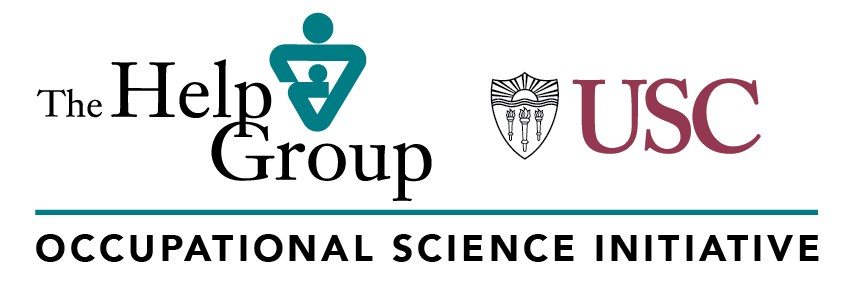
Overview
ABOUT THE HELP GROUP – USC OCCUPATIONAL SCIENCE INITIATIVE
The Help Group – USC Occupational Science Initiative, formed in 2015, is dedicated to developing evidence-based intervention programs for children with autism spectrum disorder (ASD) through the guidance of an interdisciplinary team of researchers, educators and clinicians.
Current Projects
Animal-Assisted Intervention
The Help Group is pleased to announce an innovative partnership between The Help Group and the University of Southern California (USC) Mrs. T.H. Chan Division of Occupational Science and Occupatio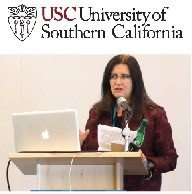 nal Therapy. The Help Group – USC Occupational Science Initiative is dedicated to developing evidence-
nal Therapy. The Help Group – USC Occupational Science Initiative is dedicated to developing evidence-
based intervention programs for children with ASD through an interdisciplinary team of researchers, educators and clinicians.
The collaboration was established to better identify how animal-assisted intervention can be integrated into a curriculum that meets the educational and therapeutic needs of 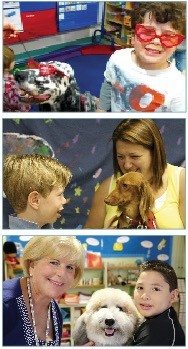 students in The Help Group’s five autism schools. “With the success of our Paws and Pals program, we recognized the benefits of having volunteers and their therapy dogs visiting our classrooms and interacting with children across the autism spectrum,” said Dr. Barbara Firestone. “The Initiative holds great promise as one of the first of its kind to demonstrate how therapy animals can be utilized to help to facilitate social behavior and communication in children and teens with autism.”
students in The Help Group’s five autism schools. “With the success of our Paws and Pals program, we recognized the benefits of having volunteers and their therapy dogs visiting our classrooms and interacting with children across the autism spectrum,” said Dr. Barbara Firestone. “The Initiative holds great promise as one of the first of its kind to demonstrate how therapy animals can be utilized to help to facilitate social behavior and communication in children and teens with autism.”
Leading the effort on behalf of USC is Dr. Olga Solomon, Assistant Professor at USC’s Division of Occupational Science and Therapy Dr. Solomon, a 2014 Summit presenter, also led a Distinguished Lecture Series presentation at The Help Group on “Animal-Assisted Therapy in Classroom and Clinical Settings” to provide practical strategies for including therapy dogs in a school setting. Joining The Help Group, under the mentorship of Dr. Solomon, is Occupational Science and Therapy Doctoral Resident, Allie Ticktin.
A program development and evaluation project is already underway this academic year at The Help Group. Therapy dog-handler teams are working in coordination with therapists and educators to develop animal-assisted activities for five to seven year-old students with mild cognitive delays and social and communicative challenges.
The Initiative is The Help Group’s third partnership with a leading research university. In 1999, The Help Group partnered with the UCLA Semel Institute for Neuroscience and Human Behavior to create The Help Group Neuropsychology program, and once again in 2007, to form the groundbreaking Help Group – UCLA Autism Research Alliance.
Dr. Firestone, “We are delighted to join with USC on this cutting-edge initiative to expand research into animal-assisted intervention and look forward to a productive collaboration to foster growth and progress for young people with autism.”
Science & Social Skills
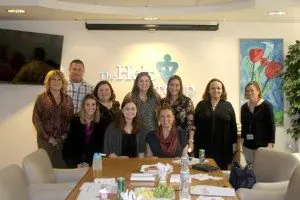
L-R Top: Pamela Clark, Jason Winburn, Stephanie Davidowitz, Katharine Mendivil, Dr. Emily Ochi, Dr. Mary Lawlor, Gretchen Bazela. L-R Bottom: Julie Peterson, Jennifer Kovacs and Monica Stephen.
The Help Group – USC Occupational Science Initiative has announced its next project to develop opportunities for advancing community-based social participation for children with autism and autism spectrum disorders.
Under the direction of Dr. Mary Lawlor, Associate Chair of Research and Professor at the University of Southern California’s Mrs. T.H. Chan Division of Occupational Science and Occupational Therapy, this pilot program will implement a science and social participation curriculum in classrooms at The Help Group’s Village Glen School and during outings at the California Science Center, an experiential science museum located in Exposition Park adjacent to the USC University Park Campus in Los Angeles.
The science and social skills curriculum will be based upon the educational and therapeutic goals of students with autism and other special needs ages 7 to 8 years old in the fourth through sixth grades. Lawlor will coordinate a team of USC occupational therapy faculty, graduate students and practitioners, in collaboration with Help Group educators and occupational therapy staff, to lead The Help Group students in a series of field trips to California Science Center throughout the spring months. These trips will be specifically structured to optimize the students’ social interactions in a museum setting, as well as to help them better access their respective grade-level science curricula.
“We are delighted to be collaborating with The Help Group and California Science Center in developing, implementing and appraising an innovative approach to learning through exploring new frontiers in science and enhancing social participation, both for students at USC and students at The Help Group,” Lawlor said.
This project is a replication of an original program designed by Dr. Ellen Cohn, Clinical Professor at the Department of Occupational Therapy at Boston University in collaboration with the Boston Public Schools and the Museum of Science in Boston. The program was designed to support students impacted by autism spectrum disorders engage in informal science learning, socially interact with each other and with educators, and feel included in a community setting.
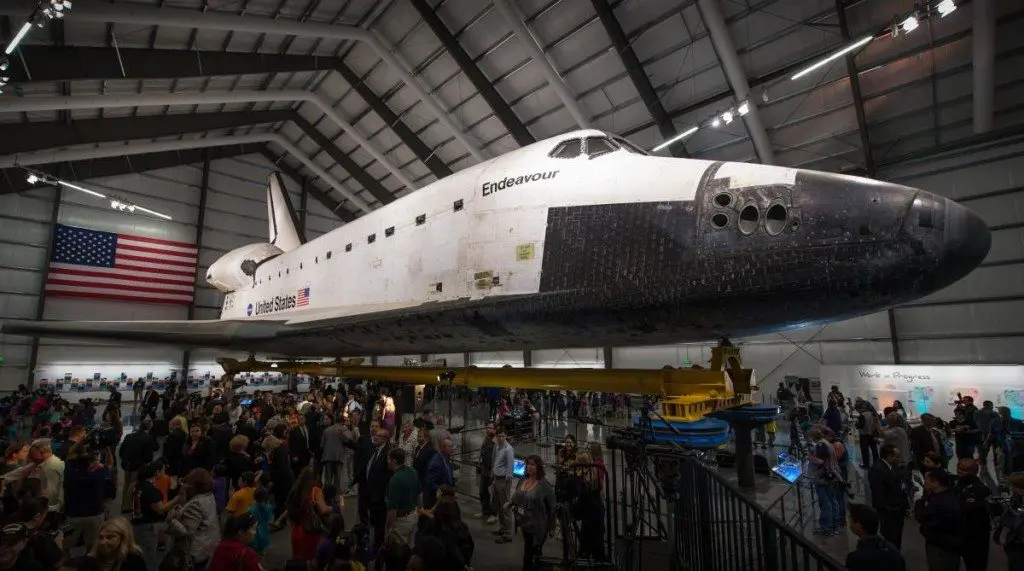
Students will experience the Endeavor and other exciting exhibits
Assisting Lawlor will be USC’s Dr. Emily Ochi, assistant professor of clinical occupational therapy; Dr. Jesus Diaz, assistant research professor; Monica Stephens, Occupational Therapy Doctorate resident; and Dr. Jenny Kovacs, postdoctoral fellow. “Our graduate students at USC are excited by this remarkable opportunity to work directly with students at The Help Group to foster science learning and facilitate engagement and community participation through the field trips to the California Science Center,” Ochi said.
“It’s university partnerships, like this initiative with USC, that inform best practice methods in our classrooms and keeps us at the cutting edge of evidence-based interventions,” said Dr. Barbara Firestone. “We are proud to continue to expand this partnership with the USC Mrs. T.H. Chan Division of Occupational Science and Occupational Therapy.

